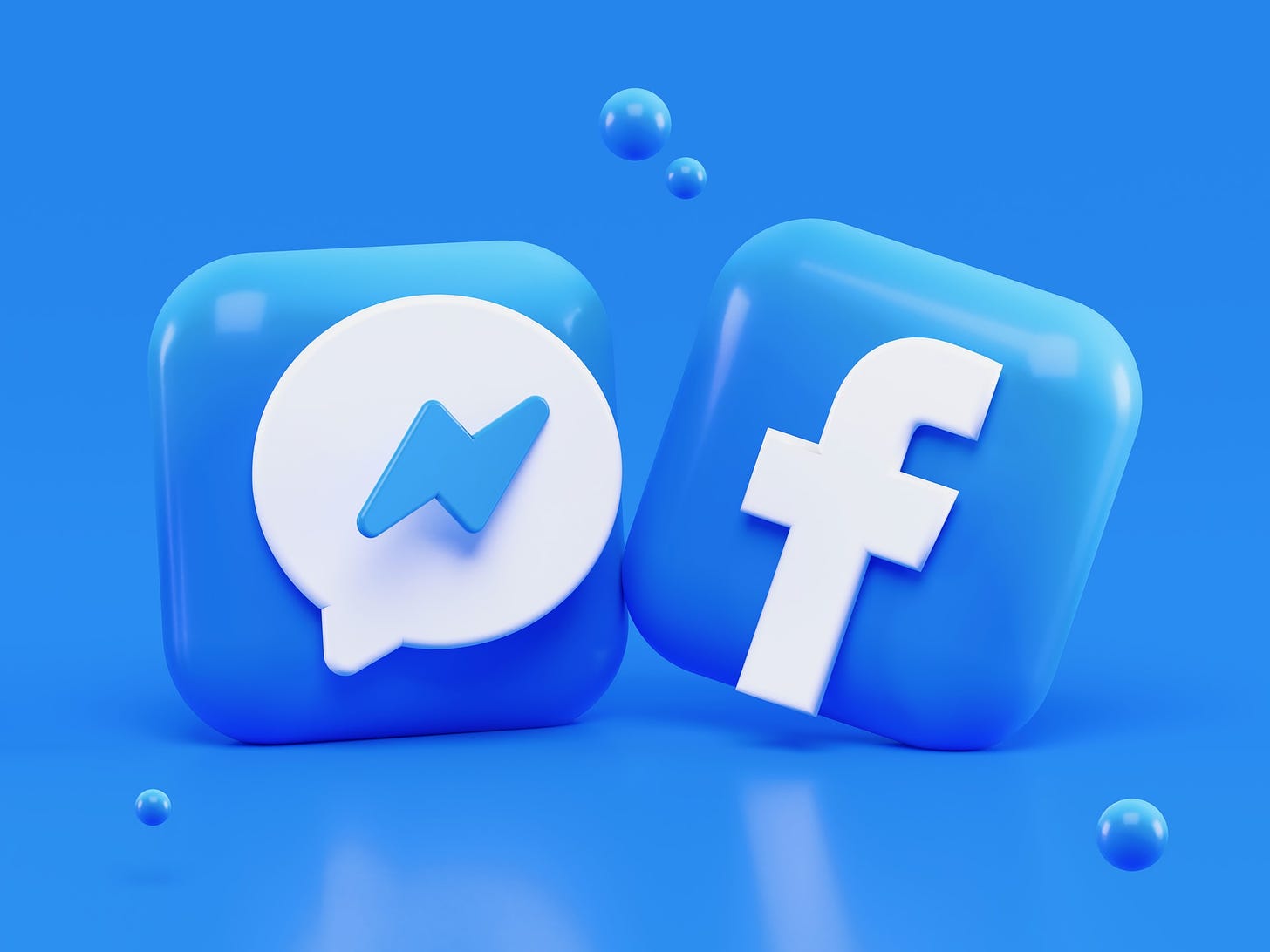Welcome to my counterpoint to my friend, Steve Berman’s point, published on Sunday that Facebook is irretrievably broken and should be broken into at least two separate companies. If you haven’t read Steve’s piece yet, you can do so here. While Steve and I agree on the fact that Facebook is a problem. We have some differences over possible solutions.
Steve correctly makes the point that Facebook controls a heckuva lot of the social media market share. I also agree with him that, even though we think of Facebook as a social media company, it is primarily an advertising company. The reason that Facebook gives you a free account on its platform is not so you can post cat pictures and funny memes. The company wants to target you with advertising messages from its partners. We also agree that Facebook’s community standards are somewhat arbitrary, are enforced unequally, and are prone to abuse.
But here we start to diverge. Even though I agree with Steve that the internet is increasingly hard to escape, Facebook itself is not representative of the internet, even if it is giant and seemingly ubiquitous. For example, I learned a while back that you cannot uninstall Facebook from your phone. In most phones, the Facebook app is preloaded and cannot be completely removed. All you can is uninstall the updates.
But I stress that Facebook is only seemingly ubiquitous. You can take that Facebook app and, even though you can’t delete it, you can park it in a folder where you’ll never see it. If Facebook is out of sight and if you can break the compulsion to check your notifications 23 times every waking hour, you soon realize that Facebook is not a necessity. After all, remember that the company exists to target us with advertising. Do we consider it a necessity to be bombarded with ads that too often seem to be creepily familiar with our thoughts and wants and desires?
We don’t buy things from Facebook. We get our groceries and clothes and electronics and cars elsewhere. Even if we buy these things online, we go to sites other than Facebook. So, Facebook is not really that important in the grand scheme of things. It is important because we voluntarily give it a place of prominence in our lives, not because we need it for basic sundries of life.
Facebook is a luxury masquerading as a necessity. The company has a symbiotic relationship with its users and advertisers (although some might argue that it is more of a parasite), but if it disappeared, no one would starve or go without shelter.
What would we do without Facebook? We might have to go to news websites individually. Or we could read email newsletters like the one you can get free from the Racket if you subscribe here.
Rather than posting our cat pictures on our Facebook wall, we might revert to the old tech from the 1990s and early 2000s of forwarding emails. (Just make sure the Racket gets forwarded to all contacts.)
Or we might just pick another platform. Per a Pew survey from 2019, 69 percent of Americans say that they use Facebook. That seems like a lot, but it’s hardly monopoly territory. For starters, that’s second place behind the 73 percent who use Google’s YouTube.
Further, Facebook does not have a monopoly on its users. Even if we stipulate that Facebook is important as a clearinghouse for information, there are a lot of other options. The survey doesn’t give specific numbers on respondents with multiple social media accounts, but we know that many of Facebook’s users also have accounts on other platforms, such as (in order of preference) Instagram (a Facebook-owned company), Pinterest, LinkedIn, Snapchat, Twitter, WhatsApp, and Reddit.
Finally, Facebook is already losing its popularity with younger Americans. My teenage son eschews Facebook as do many whippersnappers. Instead, those users go to Snapchat and Instagram. Instagram is owned by Facebook but Snapchat is owned by an independent company.
Steve makes his argument for breaking up Facebook on the grounds that it is a near-monopoly, but many of Facebook’s critics are more open that what they object to is “Fascistbook’s” ideology, or at least what they perceive the company’s ideology to be. When the Federal Trade Commission filed a lawsuit against Facebook in December, the grounds were that the company unfairly stifled competition even though most of the cheering was from people who accused the company of censorship. The ideology of Facebook as well as its critics would become a legal issue in any attempt to break up the company. I’m not aware of the US government ever breaking up a company because users didn’t like its political viewpoint and that would be a dangerous road to start down. In fact, Facebook gained approval from the same FTC that is now suing it before it acquired WhatsApp and Instagram.
And it’s the censorship question that draws the most attention. Amid his concerns about monopolistic behavior, Steve acknowledges that point with his very legitimate concern about users “losing years of work, memories, and connections to others.” I agree that this is a big concern for many Americans who have spent the last 10 to 15 years letting Facebook show the world their children as they grew up.
But the censorship question is what makes the issue constitutionally tricky. As a private company, Facebook is not subject to First Amendment limitations, but the government that would regulate or break it up is. Put more simply, Facebook users do not have a First Amendment right to post on the platform, but Facebook does have a First Amendment right (as well as a Section 230 right) to set its own community standards.
Even if First Amendment protections were extended to Facebook users, there is a difference between speech and reach. After a right to post on Facebook is established, the next battles would be about throttling posts, limiting reach, and shadow-banning. But the First Amendment only guarantees a right to speak with government interference. It does not guarantee a platform or an audience, no matter how much some of us might wish it did. (And I’m not suggesting that Steve is making this argument.)
There are many false equivalences and bad analogies going around about the internet and censorship. Yesterday, I saw someone post a Dan Bongino clip that made the claim that Amazon’s delisting of certain books was akin to a 21st-century book-burning. But not selling books is far different than burning them, even if we’re talking about a huge internet retailer, and de-platforming people from Facebook is not the same as infringing upon their freedom of speech. These may be acts that are biased and annoying and infuriating, but they are not unconstitutional or illegal. (Neither is burning books, for that matter, as long as they are your books and you obey local fire laws.)
As with many of the culture war arguments, for me, it comes down to property rights and the freedom to associate. Facebook is a private company that built its own network and has the right to set its own rules. It can kick out the users that it doesn’t want just as the manager of Bath and Body Works has the right to kick out unruly candle-loving ladies.
There is a role for the government, however. Facebook has grown by leaps and bounds through its past acquisitions, at least some of which have been explicitly approved by the government. If and when Facebook seeks approval for another acquisition, the government can make a case that the company should not grow any larger and block it. I think a case can be made for restricting Facebook’s future growth, but it is not a good thing for the FTC to reverse decisions that it made five or six years ago and attempt to break up acquisitions that it blessed.
I do understand that Steve is advocating for Facebook to break itself up rather than for government action, but I see little chance of this happening, at least not in the near term. Maybe somewhere down the road, likely after Mark Zuckerberg’s tenure is over, the company will come to view itself as too unwieldy to continue, but I think that we are a long way from that point. What Mark Zuckerberg wants is more government regulation so that Facebook can freeze out new entrants to the social media marketplace so that the company can expand its market share even further.
I am intrigued by Steve’s idea for licensing Facebook, however. I think that a lot of Facebook’s problems would be solved by eliminating some of the anonymity that goes with Facebook accounts. Many of the troublemakers use fake names or have backup accounts to continue posting while they are in Facebook jail. The company has already taken some steps in this direction by encouraging users to verify their accounts with phone numbers instead of relying totally on email addresses. A user might have a dozen email addresses, but chances are that they only have one phone.
The downside is that the unintended consequence of eliminating anonymous accounts might be to push users to other platforms where identities can stay hidden. This wouldn’t necessarily be bad for people who want Facebook’s power to wane, but it could end up just moving the problem of extremism and internet bullying to other accounts. There’s also a fair amount of anecdotal evidence that even people whose identities are not hidden can post stupid and embarrassing things on the internet.
In the end, I’m going to look to the free market for a solution to the problem. That could take several forms. One would be for Facebook to respond to its users’ requests by becoming transparent and improving its appeals process, as I suggested on Saturday. Ultimately, if Facebook angers its users, it will see its revenues and power decline. The company does not want that.
Another option would be for political chat to move to another, more open platform. The trick is going to be finding a balance between rules that are too stringent and having rules which are nonexistent, making the platform a seamy underworld of filth that few would want to inhabit. For all its faults and overreach, a lot of people still want to be on Facebook, possibly because it does work hard to eliminate hate speech, incivility, and obscene material.
There are a lot of Republican-leaning billionaires, but so far, none of these deep pockets has bankrolled a conservative social media platform. That says a lot about both Facebook’s strength, even as many people have sworn off the platform, and the questionable business plan of a social media platform that targets conservatives. We might ask why the Koch brothers or Sheldon Adelson never got behind a Parler-type site.
As to the problem of losing a lifetime of pictures and work on Facebook, storing your memories on anything is risky. Even hardcopy photo albums can be destroyed or damaged by fires or floods. The best idea is to hedge your bets. Back up your Facebook photos with another cloud service or an external hard drive. Or both. There are many tutorials online that give instructions on how to back up Facebook data.
We are all familiar with the phrase “caveat emptor,” let the buyer beware. That’s good advice, especially when it comes to a company that profits from using our personal data to target us with ads. Since most of us are users, rather than customers of Facebook, we need to modify the Latin phrase slightly.
Caveat usor. Let the user beware.



No comments:
Post a Comment